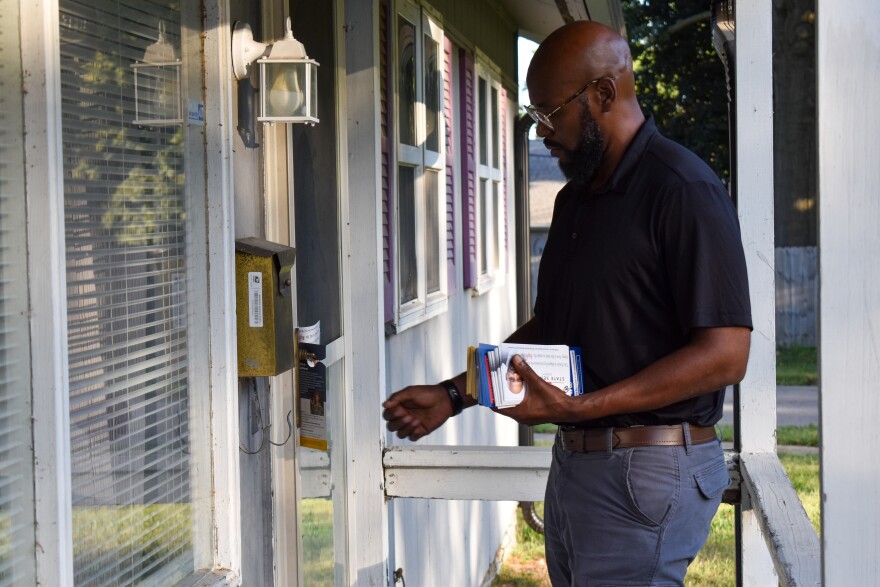Derron Black estimates that it's been at least 50 years since Missouri’s 9th District in the state Senate, a majority Black district which covers Kansas City’s East Side, Raytown and parts of South Kansas City, has elected a Republican to represent it.
In past years, that fact was something he was proud of. Now, however, he sees the district’s decades-long streak of Democratic leadership as a problem.
“We still have the same political establishment. We still have the same rhetoric,” says Black. “The condition, in my opinion, hasn't gotten better. The quality of life has actually gotten worse!”

Black, a 41-year-old Navy veteran and native of District 9, is running as a Republican for the first time. He ran unsuccessfully for other state offices in the area as a Democrat in 2012, 2016 and 2020.
He says his decision to switch his party was a decades-long process, one fueled by what he saw as a failure of local and state Democratic candidates to bring economic development and lasting quality of life improvements to the East Side communities where he grew up.
He claims many voters in the district, especially Black voters, feel the same frustration. Community leaders and his incumbent opponent, Democrat Barbara Washington, say otherwise.
“The needs of the 9th District today,” explains Washington, “are not parallel with what the Missouri Republican party appears to be.”
‘Many people switched parties’
The current streak of Democratic voting in District 9 began in the mid-1960s.
Bishop James Tindall, a former Jackson County legislator and leader with the Black political organization Freedom Incorporated, says the Democratic leanings of the 9th District began with the Civil Rights Movement.
“At that time most of the African American community was Republican,” explains Tindall. “Many people (switched parties) because the Democratic Party embraced the civil rights struggle.”
The switch by Black Americans to the Democratic Party can largely be attributed to the 1964 presidential election, when Republican presidential candidate Barry Goldwater courted the Southern, white suburban vote by saying the 1964 federal Civil Rights Act should have been left to individual states to decide.
Goldwater’s opponent, then-President Lyndon B. Johnson, had signed the act into law shortly before Goldwater received his party's nomination.
The Rev. Dr. Vernon Howard, president of the Greater Kansas City Chapter of the Southern Christian Leadership Conference, says this switch illustrates the struggle Black Americans face in finding support for their communities nationwide.
“Here’s what matters to Black people. What kind of policies, what kind of laws are you either going to put in place or strike out to the benefit of Black people?” says Howard. “It doesn't matter if you're Black, white, Democrat or Republican. That’s the severity of the crisis we are in.”

“We’re raised very conservative”
Derron Black believes voters in his district can be convinced, as he was, that Republican economic policies and Republican leadership are better suited to mitigating this crisis and securing resources for the area.
He also believes that older, more religious Black voters in the area will identify with conservative viewpoints more than people think.
“For the most part, Black people from my generation were raised very conservative,” claims Black. “My great grandfather was the minister of our church. What is perceived to be liberal today, those ideas weren’t the cornerstone of what we understood our experience to be.”
Black says that during his time as a Democrat he often pushed himself to the left of what his core beliefs were, specifically citing his religious upbringing as the origin of some of his conservative values.
He claims older, more religious Black voters share this experience. But faith leaders like Howard take issue with Black’s assessment.
“There’s no question that the church, historically, has been conservative socially,” says Howard. “The church, historically, from a political standpoint, has been radical, has been progressive, has confronted the powers that be to change. The Black church does not just have one side of her.”
Howard’s words reflect both current and historical findings. Data included in the 1972-2022 General Social Survey indicate that at least 70% of secular and religiously affiliated Black voters have consistently supported Democrats in that time frame.

Despite this, the same survey shows a significant drop in Democratic party support among subgroups of Black voters, such as non-denominational and Catholic voters. However, that doesn’t mean they’re leaving to support Republicans.
Instead, they’re disengaging altogether. Rev. Howard believes this apathy illustrates the core conflict between modern conservatism and the struggle of Black Americans.
“Conservatism is not something Black people are excited about,” says Howard. “Conservatism has to do with protecting the status quo, with as little change as possible … with keeping things as are the norm. That’s not in the interest of Black people.”
“The energy is just not there for them”
As he’s been knocking doors in the district, Black says that the main type of voter he’s interacted with isn’t a Democrat. It’s a person who’s never voted at all.
“They are totally disengaged,” says Black. “They feel, basically, that their vote doesn't count.”
Voting precincts within Missouri’s 9th Senate District have some of the lowest numbers of registered voters, and some of the lowest voter turnout rates of any precincts in Jackson County.
Black blames this apathy on the failure of elected Democrats, saying that the party has little to show for its decades of control.
Bishop Tindall, who has helped elect many of those Democrats, asserts that the Republican controlled state legislature is to blame for the inaction. He points to past attempts to redistrict the area as evidence of Republicans trying to weaken the political power of Jackson County’s urban core.
“(Our interests) are not represented in the state,” says Tindall. “Republicans in power have gerrymandered the whole city so that we won’t have the proper representation to get the resources we need.”
The 9th District recently underwent redistricting in 2023, expanding east to include additional areas of Raytown and far eastern Kansas City, while carving out a large chunk of the Historic Northeast.
Black says that the best way to help the district is by electing a Republican to work with the majority in Jefferson City. He believes he’s identified a way to engage some of the area’s most apathetic residents.
“For the younger generation, for African American men, the energy from the Democratic Party is just not there for them,” he claims.
Black sees an opportunity to build support for future Republican candidates, and the party as a whole, by engaging with young Black men in particular.
He’s turned to his personal connections with prominent Kansas City influencers and people in the local hip-hop scene to push his campaign’s message.
His strategy is one that mirrors what former President Donald Trump, who Black endorses, is doing on a national scale in an attempt to gain a foothold among Black voters.
“It’s one of the things I learned from the Bernie Sanders campaign,” explains Black. “If you can create the energy with the youth, the message actually kind of spills over into the other areas you’re trying to get into.”

Black admits that, locally, this strategy has had limited success. But recent national polling suggests that youth-focused strategies may be pushing new generations of Black voters to an affinity for the Republican party.
According to data published by the 2024 National Black Voter Project, 42% of Black Americans ages 18 to 29 feel the Republican party was at least somewhat welcoming to them, a full 18 percentage points higher than Black Americans their parents’ age.
For Howard, these national polls are irrelevant to the day-to-day lives of those living in District 9.
He claims the local Republican party has not earned the trust of Black voters in the area, but instead chooses to focus on development projects that serve wealthy white residents.
“The fact of the matter is conservatives usually would rather, like is happening right now, build a Four Light,” says Howard, “while we still have severe housing inequities in this city, that predominantly affect Black and brown people, and white poor people in this city.”
Black claims he and the local Republican Party are working to earn that trust, but previous election results show they face an uphill battle.
Only one Republican candidate has run to represent the Missouri 9th District in the last 12 years. They received 18% of the vote.






